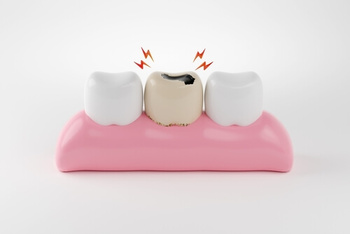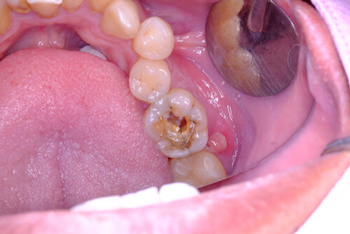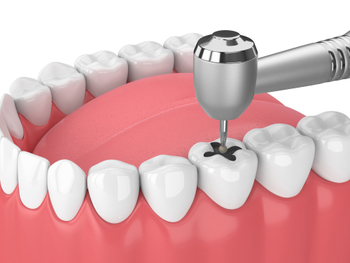Have you ever wondered if tooth decay can spread from one tooth to another? It is a common question, and many people are surprised to learn that cavities can indeed affect neighbouring teeth if left untreated. Can tooth decay spread to neighbouring teeth? In this article, we will unpack how tooth decay develops, why it can spread, and the best ways to protect your oral health.
What Is Tooth Decay and How Does It Begin?
Tooth decay, also called dental caries or a tooth cavity, occurs when harmful bacteria in the mouth break down the tooth’s enamel, which is the hard outer surface of the tooth. These bacteria feed on sugars found in the foods you eat, especially sugary foods and drinks. They create acids that attack the tooth’s enamel, leading to tiny holes called cavities.
Tooth decay often starts in its early stages as a soft spot or a faint discolouration. At this point, the damage is minimal, and treatments like fluoride treatments can help to repair weakened enamel. However, if left untreated, tooth decay can worsen, making its way deeper into the tooth and potentially spreading to other teeth.
Can Tooth Decay Spread to Other Teeth?
Harmful bacteria, such as Streptococcus mutans, live in plaque – a sticky film that forms when you eat or drink. These cariogenic bacteria can multiply in areas where brushing and flossing are neglected, especially along the gum line and chewing surfaces of the back teeth. If not addressed, the bacteria can affect neighbouring teeth and create more tooth cavities.
Is Tooth Decay Contagious?
It may sound surprising, but cavities can be contagious in certain situations. The bacteria responsible for tooth decay can be passed from one person to another. Sharing drinks, eating from the same spoon, or even a simple kiss can pass these harmful bacteria from person to person. This is especially relevant for young children, as parent-child interaction, like tasting a child’s food, can introduce cavity-causing bacteria into the child’s mouth and affect their oral health.
Understanding the Early Stages of Tooth Decay
Tooth decay does not happen overnight. It starts with plaque and bacteria feeding on leftover sugar from foods and drinks. The early signs of tooth decay might be subtle, such as slight sensitivity or faint white spots that indicate demineralisation of the tooth’s enamel. At this point, a strong oral hygiene routine and enough fluoride can help halt or even reverse the damage.
The Hidden Dangers of Leaving Tooth Decay Untreated
If tooth decay is ignored, it can quickly turn into a more serious problem. It doesn’t just stay on the surface; it can move deeper into the tooth, creating a cavity and eventually reaching the pulp, where the nerves and soft tissue are located. At this stage, the discomfort often becomes more intense, and you might need more extensive treatments such as a filling, a root canal, or, in some cases, an extraction to restore your oral health.
Moreover, untreated tooth decay can affect adjacent teeth. The harmful oral bacteria can multiply and move to other teeth, leading to more decay and a higher risk of gum disease.
How Diet Influences the Spread of Tooth Decay
Choosing sugar-free gum, drinking fluoridated tap water, and limiting sugary or acidic drinks can make a big difference. Saliva production is another vital component in this process, as it naturally neutralises acids and helps wash away food particles and harmful bacteria.
Simple Ways to Protect Your Child’s Teeth from Day One
Children’s teeth are particularly susceptible to decay because their enamel is thinner and less mineralised than adult teeth. Teaching kids the significance of brushing and flossing early in life, ensuring they use fluoride toothpaste, and making routine visits to the dentist can set the foundation for strong oral health. Being cautious about sharing a child’s food or allowing them to drink from the same cup can also reduce the risk of spreading harmful oral bacteria.
Simple Habits to Prevent Tooth Decay and Its Spread
Here are a few effective methods you can use to protect your smile and prevent cavities from spreading:
- Brush twice a day: Use a soft‑bristled toothbrush and fluoride toothpaste every morning and night to clean away plaque and kill bacteria.
- Floss daily: Flossing cleans between teeth and along the gum line, where toothbrush bristles often miss.
- Drink fluoridated tap water: Fluoride strengthens tooth enamel and helps prevent cavities.
- Limit sugary foods and drinks: Lowering sugar intake gives harmful bacteria less ‘fuel’ to attack your teeth.
- Chew sugar-free gum: This can help stimulate saliva production and neutralise harmful acids after you eat.
- Visit your dentist regularly: Regular checkups can spot the early signs of tooth decay and help protect other teeth from damage.
The Role of Fluoride Treatments in Preventing Cavities
Fluoride treatments are a powerful way to protect your teeth. They work by strengthening the enamel and making it more resistant to acid attacks from harmful oral bacteria. You can have these treatments applied by your dentist, or get the benefits every day from fluoride toothpaste and fluoridated tap water. By adding fluoride to your routine, you can help stop tooth decay from getting worse and spreading to other teeth.
The Surprising Connection Between a Healthy Mouth and a Healthy Body
Looking after a healthy mouth is about more than just a beautiful smile. The harmful bacteria that cause dental decay and gum disease can also have a huge impact on your overall health if they’re not properly managed. By prioritising brushing and flossing, making wise dietary choices, and seeing a dentist regularly, you can protect both your teeth and your general well‑being.
Frequently Asked Questions About Tooth Decay
- Can tooth decay really spread from one tooth to another?
While tooth decay doesn’t jump between teeth like an infection, the harmful oral bacteria that cause decay can move to nearby teeth, especially when poor oral hygiene allows plaque to build up. This is why it’s so important to maintain good oral hygiene and have cavities treated promptly.
- What are the early signs of tooth decay?
Early signs can include sensitivity to hot or cold drinks, faint discolouration, or a rough spot on the surface of a tooth. At this early stage, treatments like fluoride treatments can sometimes reverse the damage.
- How quickly can tooth decay spread?
Tooth decay can develop and spread within months if it is ignored, especially when oral hygiene is poor. The earlier it is caught and treated, the better.
- Can a cavity heal on its own?
A cavity cannot heal itself once it has progressed beyond the very early stages. At this point, a dentist needs to remove the decay and restore the tooth.
-
Treatment depends on the severity. Your dentist may recommend a filling for early decay, a crown for more advanced damage, or a root canal for deep infections. Regular dental visits can catch decay early, making treatments less invasive and more effective.
- Are cavities contagious between people?
Yes, the bacteria that cause cavities can be passed between people. These harmful oral bacteria can be transferred through sharing drinks, using the same utensils, or kissing. Maintaining good oral hygiene and avoiding sharing items that touch the mouth can help reduce the risk of spreading cavity‑causing bacteria.
Final Thoughts: Stay Ahead of Tooth Decay
So, can tooth decay spread? The answer is that while the decay itself doesn’t ‘move’ between teeth like an infection, the harmful oral bacteria that cause cavities can certainly affect other teeth. The best way to protect your smile is by keeping up a solid oral hygiene routine, making smart food and drink choices, and seeing your dentist for regular check‑ups.
Remember, tooth decay doesn’t have to be inevitable. By understanding the early signs and knowing how to prevent cavities, you can stop tooth decay before it becomes a bigger problem. Protect your teeth and gums now, and you can enjoy a healthy, confident smile for many years to come.
If you’d like more information about cavity care or need help with early signs of tooth decay, make an appointment with Available Dental Care today at (02) 4062 8763 or (02) 4628 0573. A professional examination can help you stay ahead of tooth decay and ensure long‑term oral health for you and your family.
References
Cleveland Clinic. (n.d.). Cavities. Cleveland Clinic. https://my.clevelandclinic.org/health/diseases/10946-cavities
Healthline. (n.d.). Best practices for healthy teeth. Healthline. https://www.healthline.com/health/dental-and-oral-health/best-practices-for-healthy-teeth
Medical News Today. (n.d.). What are dental and oral health methods? Medical News Today. https://www.medicalnewstoday.com/articles/327168
TeachMePhysiology. (n.d.). Secretion of saliva. TeachMePhysiology. https://teachmephysiology.com/gastrointestinal-system/mouth/saliva-secretion/




